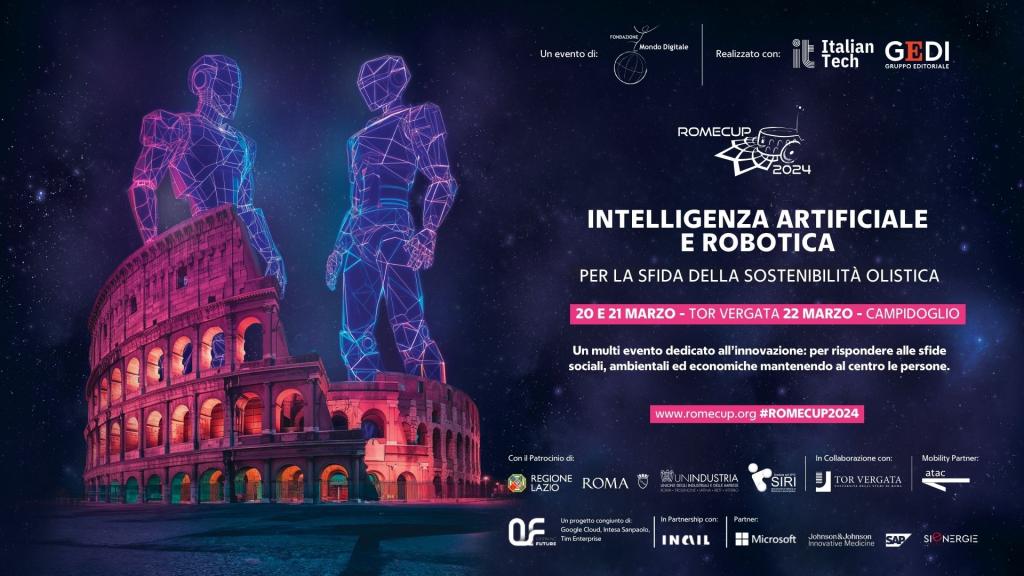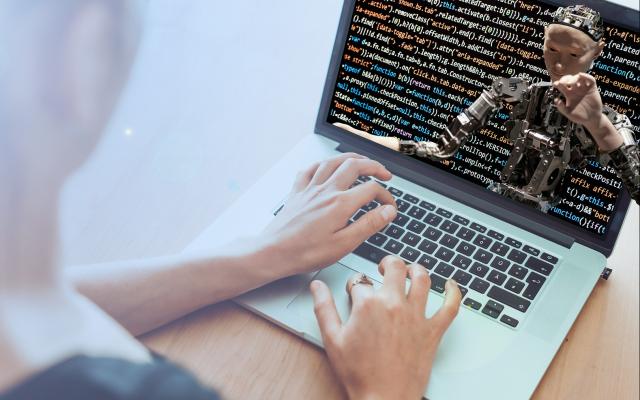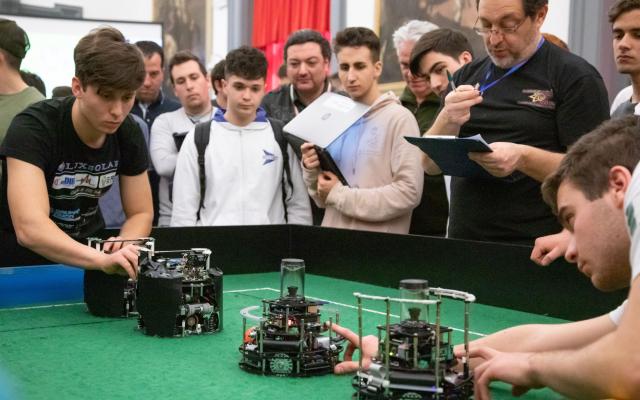The Majorana School from Pozzuoli at RomeCup 2024
Il professore Paolo Borrelli, docente di informatica dal 2015, vanta una lunga esperienza nel mondo dell'informatica, che spazia dalle scuole superiori all'università, dalla ricerca alle aziende.
Nonostante il successo nel mondo del lavoro, ha scelto di dedicarsi all'insegnamento per condividere la propria conoscenza con i giovani. Attualmente insegna al liceo Ettore Majorana di Pozzuoli (Napoli). Questa scelta, pur avendo comportato una riduzione dello stipendio, è stata per lui un'esperienza appagante.
"La scuola offre un'attrattiva unica: il privilegio di vedere le nuove generazioni assorbire il sapere è un'esperienza senza eguali. Sono grato per il fatto che i miei studenti mostrino interesse per esperienze pratiche e si avvicinino alla tecnologia con curiosità e desiderio di apprendere. Attraverso iniziative come il laboratorio Ital.IA Lab, abbiamo ottenuto risultati eccezionali. Il Piano Nazionale di Ripresa e Resilienza (PNRR) ha contribuito a dare una svolta significativa alla nostra scuola, consentendoci di implementare progetti innovativi e formare una nuova generazione di studenti orientati alla tecnologia".
Sul perché abbia deciso di partecipare alla RomeCup, Borrelli risponde che "la mia passione per la scuola è pari alla mia passione per la robotica. La mia esperienza nel campo mi ha permesso di portare l'interesse per questa disciplina nel Sud Italia attraverso iniziative come la Nao Challenge e la RomeCup”.
Un messaggio per chi crede che la tecnologia costituisca un pericolo e non un'opportunità?
“Riflettendo sulle tappe miliari che ho vissuto nel campo dell'informatica, riconosco che ogni avanzamento tecnologico ha suscitato sia entusiasmo che timore. Il timore più grande riguarda ora l'accelerazione dei tempi di sviluppo, soprattutto nell'intelligenza artificiale, che potrebbe portare a cambiamenti così rapidi da creare un senso di ‘indigestione’ nella società”.
“Per questo è importante coinvolgere le nuove generazioni", sottolinea. "Non solo gli studenti STEM, ma anche coloro che studiano discipline umanistiche, poiché avranno un ruolo cruciale nell'orientare l'impatto dell'IA sulla società”
“Il futuro dell'IA dipende dalla nostra capacità di utilizzarla in modo etico e responsabile”, conclude Borrelli. "Sebbene alcuni ruoli professionali possano subire ridimensionamenti, si apriranno nuove opportunità di lavoro per coloro che sono in grado di gestire e guidare l'evoluzione dell'IA. La conoscenza umana è il nutrimento principale dell'IA e, pertanto, quanto più ampia è la nostra conoscenza, tanto più positivo sarà l'impatto dell'IA sulla società".
Un messaggio condiviso, quello del professore, anche dalla dirigente scolastica Elena Manto.
“È cruciale avvicinare i ragazzi alle nuove tecnologie per far loro comprendere sia i benefici che i rischi, e per introdurli ai diversi ambiti di utilizzo, come quello medico-scientifico. Il nostro istituto, situato in un contesto culturalmente e socialmente svantaggiato, aspira a diventare un punto di riferimento per queste attività, offrendo ai ragazzi l'opportunità di prospettive diverse e di aprire una finestra sul mondo. Accompagniamo i nostri studenti verso le professioni del futuro, sfruttando al massimo il loro entusiasmo per ottenere non solo competenze nel campo della robotica, ma anche migliorare la socialità, il lavoro di squadra, la cooperazione e il rispetto reciproco."
Cosa vi ha spinto, come Istituto, a partecipare alla RomeCup?
"Abbiamo deciso di partecipare alla RomeCup su indicazione del professor Borrelli", continua la dirigente. "Abbiamo piena fiducia nelle potenzialità che questi settori offrono ai nostri ragazzi. Il mondo sta evolvendo rapidamente e noi dobbiamo fornire loro gli strumenti necessari per comprendere e influenzare questo cambiamento. Sono loro i cittadini del futuro, e per questo è essenziale che abbiano l'opportunità di confrontarsi con altre realtà, sia per il valore intrinseco della robotica, sia per gli aspetti formativi che ne derivano".
Paolo Borrelli, Professor of computer science since 2015, has a vast experience in the world of ICT that ranges from high school to university and from research to companies.
Notwithstanding his success in the working world, he chose to teach to share his knowledge with the young. He currently teaches at the Liceo Ettore Majorana in Pozzuoli (Naples). This choice – although it came with a pay cut – has been very satisfying for him.
“Schools provide a unique attraction: the privilege of seeing the new generations absorb knowledge is an unrivalled experience. I am happy that my students are interested in practical experiences and seek technology out with curiosity and a desire to learn. Thanks to initiatives such as the Ital.IA Lab, we have obtained excellent results. The National Resilience and Recovery Plan (PNRR) was a significant turning point for our school and allowed us to implement innovative projects and train a new generation of technology-oriented students.”
On why he chose to participate in RomeCup, Prof. Borrelli answers “my passion for school is equal to my love of robotics. My experience in this field has allowed me to introduce it to southern Italy through initiatives such as the Nao Challenge and RomeCup.”
A message for those who believe that technology is a danger rather than an opportunity?
“Reflecting on the milestones I have seen in the field of computer studies, I understand that every technological advance has brought about both enthusiasm and fear. The greatest fear concerns the acceleration of artificial intelligence that could bring about such rapid change that society may not be able to digest it.
“This is why it’s important to involve the new generations,” he emphasises. “Not just STEM students, but also those studying humanities, as they will have a crucial role in orienting the impact of AI on society.”
“The future of AI depends on our ability to use it ethically and responsibly,” concludes Borrelli. “Although some professional roles could be downsized, there will be new opportunities and jobs for those capable of managing and guiding the evolution of AI systems. Human knowledge is the main fuel of AI, so the greater our understanding, the better the impact of AI on society will be.”
And the professor’s message is also shared by the School Director, Elena Manto.
“It’s crucial to introduce the students to new technology and allow them to understand both the benefits and the risks, as well as to introduce them to its many different uses, such as the medical-scientific one. Our school, which is located in a culturally and socially disadvantaged context, aim to become a reference point for this type of activity, providing students with a wide range of opportunities. We orient our students towards the jobs of the future, fully exploiting their enthusiasm not only to learn about the world of robotics, but also on how to improve sociality, teamwork, cooperation, and reciprocal respect.”
What drove your school to participate in RomeCup?
"We decided to participate in RomeCup based on Prof. Borrelli’s advice," explains the Director. “We have full trust in the potential that these sectors can provide to our students. The world is evolving rapidly, and we must provide them with the tools necessary to understand and influence this change. They are the citizens of the future, and it is essential they have the opportunity to confront themselves with different realities, both for the intrinsic value of robotics and for its educational aspects.”





